Fresh fruits are a firm favorite with guinea pigs, and strawberries are no different. They’re sweet and full of fiber and vitamins, plus they make a lovely change from your piggy’s standard food pellets. Not to mention, your piggy will look downright adorable tucking into some fresh nosh.
But you might be harboring some questions: can guinea pigs eat strawberry leaves? Aren’t the berries too high in sugar? How would they fit into my guinea pig’s established diet?
The answers to all these questions and more await in this article, where you’ll learn everything you need to know about whether guinea pigs can eat strawberries.
What is a typical guinea pig’s diet?
Unlike hamsters (there are big differences between hamsters and guinea pigs) who are omnivores, guinea pigs are exclusively herbivores. They thrive off of a diet of fresh hay, fruits, and veggies – and their standard pellets, of course.
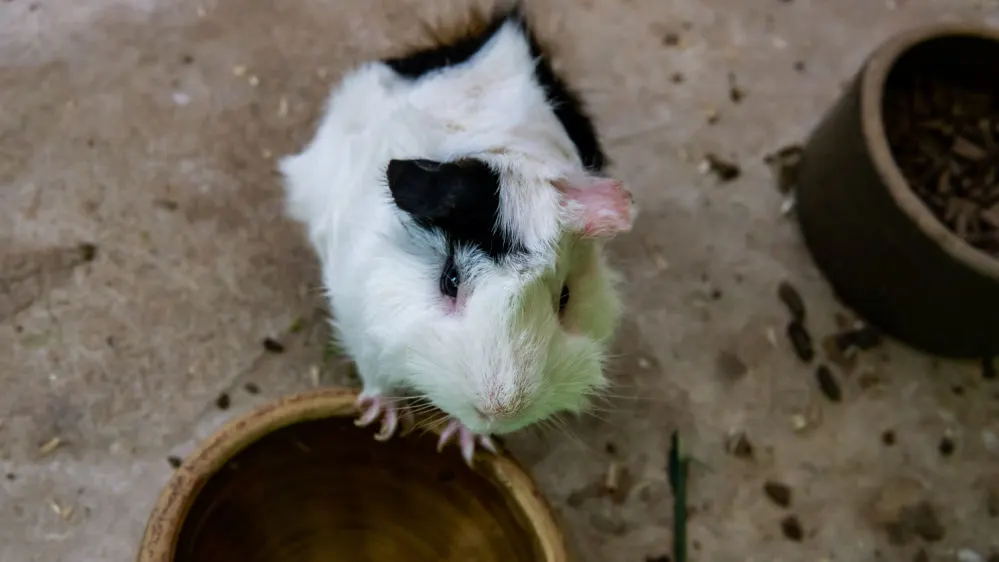
Although they may be keen to pig out (pardon the pun) on some cheese and other dairy products, it’s not good for their health. Processed foods like this can not only lead to digestive issues but may also cause more severe problems.
Even some fruit or vegetables can pose a risk to a guinea pig, either through choking hazards or containing compounds that may harm your piggie. One such example is apples as the seeds contain cyanide, and another is raw potatoes due to the high starch content.
You also shouldn’t mix up your guinea pig’s pellets with that of other small animals as a guinea pig’s diet has unique requirements, and you might unwittingly harm your pet. Stick to food specially formulated for guinea pigs and your furry friend should be just fine.
Are strawberries good for guinea pigs?
As it turns out, strawberries are a fantastic food to treat your furball with, and there are a bunch of reasons why. Let’s take a closer look at some ways in which strawberries might just improve your guinea pig’s quality of life.
Strawberries have tons of vitamin C
Sailors and guinea pigs have one thing in common: they’re both susceptible to scurvy as a result of a vitamin C deficiency. That’s because the bodies of guinea pigs can’t produce their own vitamin C, so it must be supplemented through diet or pure vitamin C drops.
This is where the humble strawberry makes its entrance and stands out from the crowd. Believe it or not, strawberries have a higher concentration of vitamin C than oranges in the same portions, making them a super vitamin C food.
So not only is it tasty, but it also comes with one of the most important food benefits for your guinea pig and its nutritional needs.
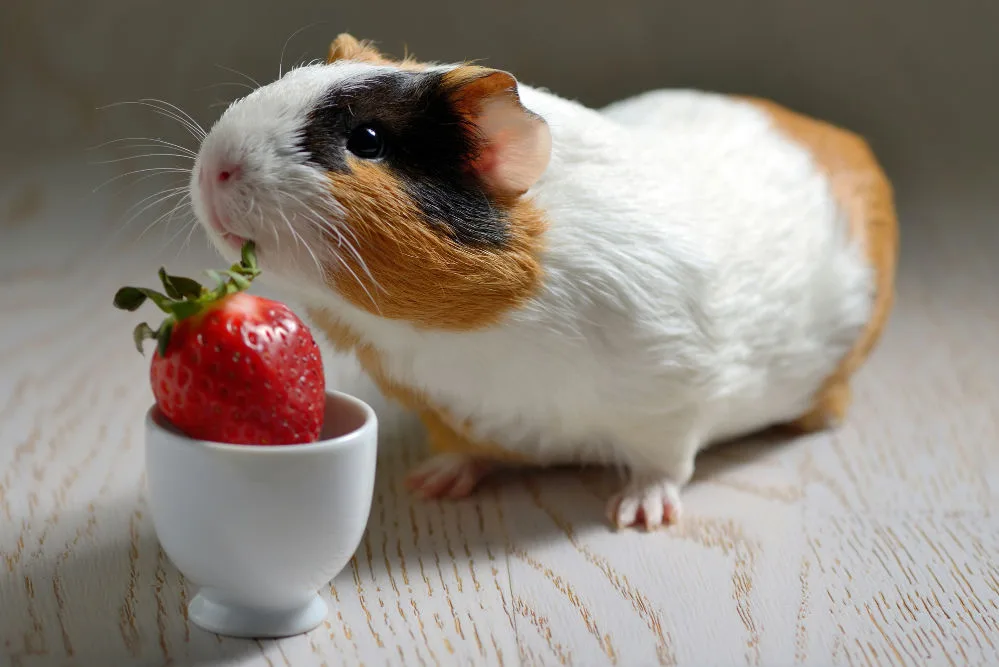
An adequate amount of vitamin C is not only necessary for the prevention of scurvy. When colds and flu hit us, we reach for the orange juice — not for its tangy flavor, but for the vitamin C it provides to optimize our immune systems and help us get well.
Vitamin C strengthens the immune system, helping to eliminate disease and reinforce the production of white blood cells. Guinea pigs tend to have weak immune systems, which is part of the reason why this vitamin is so necessary to a piggy’s diet.
Strawberries can assist with weight loss
Guinea pigs can get chunky or even obese quite easily if they aren’t active enough and don’t exercise, and if they have a calorie-dense diet. These plump red fruits are low in calories and fat, making them not only a tasty snack but a diet-friendly one too.
As if the low calories weren’t enough to convince you, strawberries also have a high amount of dietary fiber and water content. This increases satiety and induces a feeling of fullness, so your guinea pig won’t be inclined to over-indulge.
Making sure your piggy is eating as much as they require and no more is an important part of their care, and choosing yummy treats that are low in calories and high in fiber is ideal. This way you still get to spoil them, and they get a varied diet with sweet fruit containing essential nutrients without getting overweight.
If you find your furry friend is a little on the chunky side nonetheless, you can always try buying some fun tunnels to encourage them to exercise more.
They have less sugar than other fruit
Although they’re succulently sweet, strawberries don’t actually have a high sugar content in comparison to some other fruits your piggy might enjoy. If you take a look at the average sugar content of 3.5 ounces (100 grams) of strawberries, it’s about 0.24 – 0.28 ounces (7 – 8 grams) of sugar.
Compared to bananas, which have 0.53 – 0.6 ounces (15 – 17 grams) of sugar per 3.5 ounces (100 grams), strawberries are remarkably light on sugar content. This makes them an ideal occasional treat for your guinea pig with the smallest chances of inducing diabetic issues or obesity.
They can regulate a guinea pig’s blood pressure
Optimal blood pressure is essential for overall health and the prevention of many sorts of health issues and diseases in guinea pigs. Potassium helps to regulate blood pressure by interfering with the effects of sodium, and strawberries have quite a bit of potassium in them.
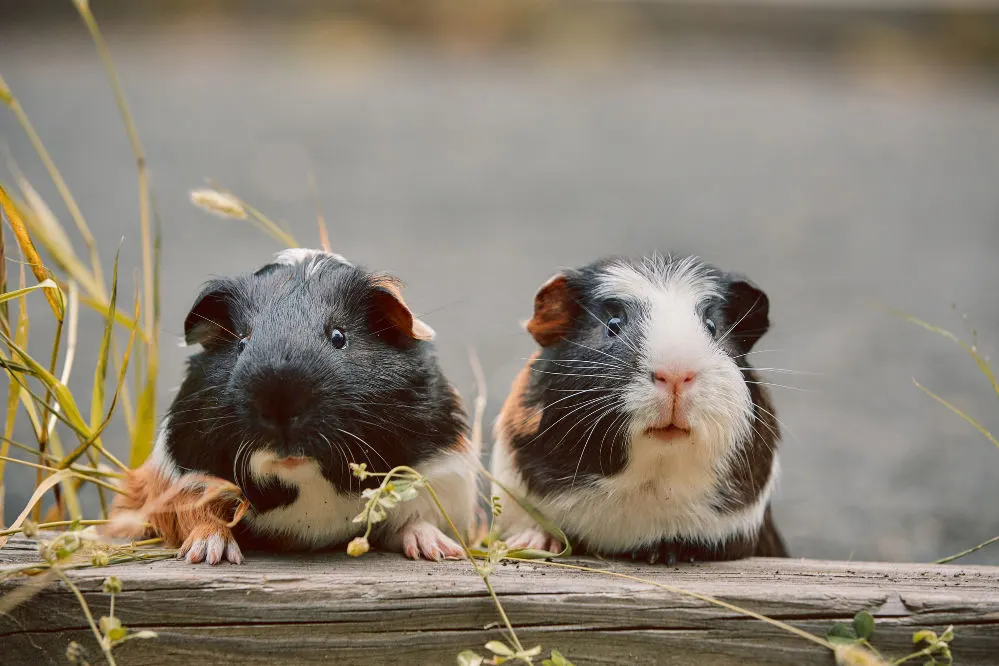
Alright, not as much as bananas — but still a noteworthy amount. Potassium can also contribute to overall health by preventing disease and infection in your piggy, thereby improving its quality of life.
Strawberries are heart-healthy
Strawberries contain two bioactive polyphenol compounds, namely anthocyanin and quercetin, which are known to help lower cholesterol in guinea pigs. This promotes better cardiovascular health in your piggy and helps them live a longer, healthy life.
Anthocyanin in particular is known to prevent chances of heart failure, as well as several other heart complications. The polyphenols present in this tasty fruit, which is known to reduce the possibility of platelet build-up and inflammation that leads to heart issues.
The high amounts of fiber and potassium also contribute to a strong, healthy heart function throughout your guinea pig’s life. It seems at this point that strawberries really are a heart-healthy superfood!
They can reduce inflammation and free radicals
Free radicals are produced by metabolic processes, and if there are too many free radicals floating around your piggy’s body that are not good news for their health. They can cause cell damage and open the door to disease and infection.
Strawberries are packed full of antioxidants like vitamins A and C, so these super fruits will help eliminate free radicals and even reduce inflammation in your guinea pig’s body. Antioxidant-rich foods are great for reducing inflammation, which can have negative health effects if it occurs on a chronic basis.
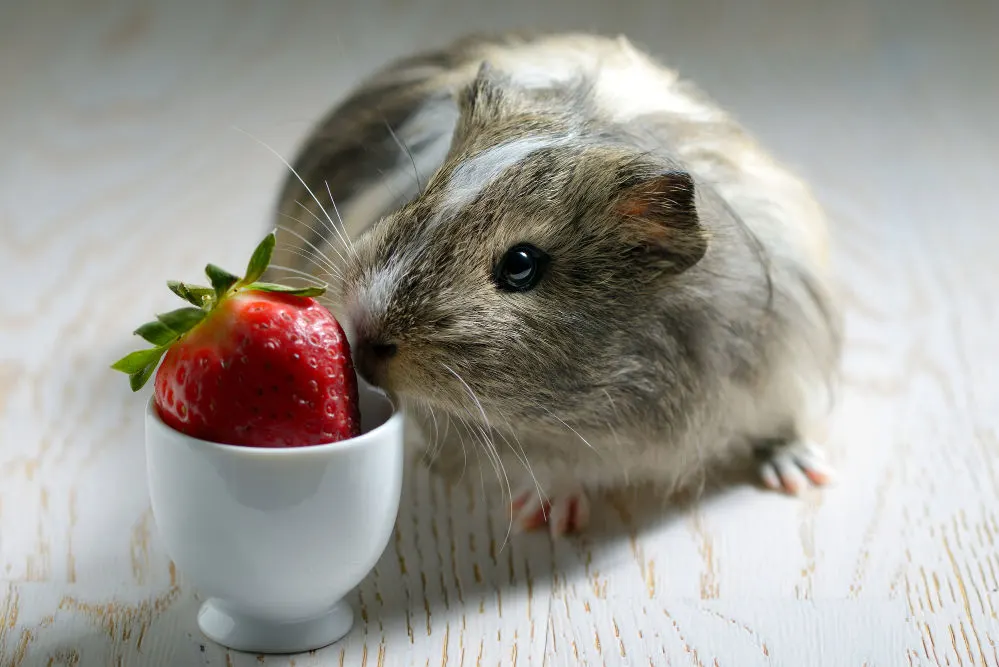
Are there downsides to letting my guinea pig eat strawberries?
This innocent fruit may hold some unusual or unforeseen risks to your guinea pig, so it’s best to know upfront what you could potentially expect.
Strawberries have extra calcium in them
Now, strawberries containing calcium doesn’t sound like a bad thing at face value, but for a tiny pet, it could potentially cause a few problems. This is because too much calcium in their diet can cause kidney or bladder stones in guinea pigs.
Don’t be alarmed, though. Your piggy would have to eat its way through a substantial number of strawberries for them to consume enough strawberry-sourced calcium to create bladder stones. As long as you stick to the recommended servings, they shouldn’t fare too badly from the extra calcium in their diet. If you’re concerned, be sure to ask your vet about the proper amount of strawberries to feed to avoid this.
It’s better to buy organic fruit
Your fluffy friend is unlikely to discriminate in the produce aisle when selecting between standard and organic fruit, but there is a good reason to opt for organic. Standard fruits are more likely to have been exposed to commercial pesticides at various stages through their growth.
It’s not something you’d want your lovely pet ingesting, especially such a small one, as the chemicals can make them very sick.
These symptoms can include stomachaches, vomiting, and diarrhea. If you notice your pet succumbing to these signs of poisoning, make sure they have plenty of fresh water first to prevent dehydration, and then get them to the vet.
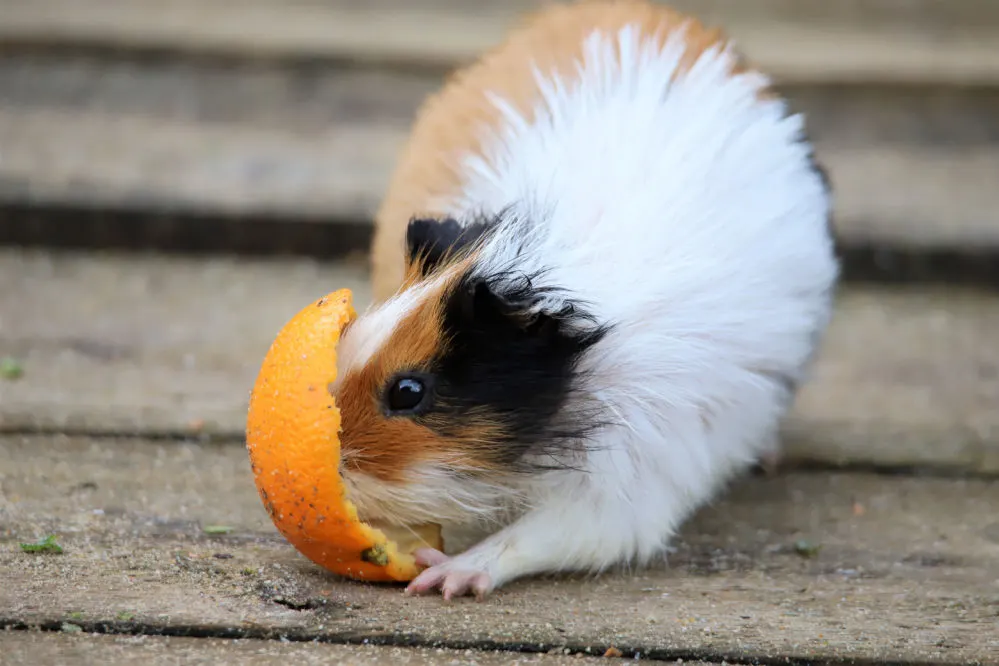
Organic fruits, on the other hand, typically don’t use pesticides, or if they do they’re environmentally friendly, making them overall a safer choice for your guinea pig.
Whichever fruit you buy and wherever you buy it from, be it a chain store or a farmer’s market, make sure you thoroughly wash the fruit before giving it to your piggy to be eaten. This way you can be sure any pesticide residue that may have been there is removed, and you can rest assured your guinea pig will be just fine.
Allergic reactions to strawberries
Surprise, surprise — in case you didn’t know, guinea pigs can suffer from food allergies, such as seeds, vegetables, rice bran, and fruits. Strawberries also fall into this category of potential allergy-inducing culprits.
Whether it’s the seeds or a certain compound in the fruit itself that causes the reaction can be a mystery. But the typical tell-tale signs that your piggy is experiencing one can be noticed is an increase in scratching, the appearance of sudden rashes, and hair loss. You might even notice a change in their digestion and stool, with symptoms like bloating and diarrhea arising.
If you do notice hair loss, it’s best to take them on a trip to the vet as this is usually a longer-term symptom that takes a few weeks to appear. This means if you’re noticing patches of missing fur, it’s likely the allergy has been going on much longer than you realized.
To check if your guinea pig is allergic to strawberries if they’ve never eaten them before, start with small amounts of the new food. A nibble or two is enough for the first time. Monitor them for any scratching and changes in skin color (most notably red) or digestive distress over the course of a couple weeks before you decide that they’re not allergic to the fruit.
If they seem to react poorly, simply stop feeding the strawberry and relegate it to the “do not feed” list. If they seem fine, you can offer them a little more and slowly build up how much they’re eating to ensure no allergic responses pop up with a larger amount in their system.
Medication interactions
If it so happens that your guinea pig is on beta blockers for any health issues, then it’s advised to not feed them strawberries. This is because of the potassium content of the sweet berry, which this particular class of medication can interfere with. This means that your pet might not be able to process the potassium they’re ingesting.
How many strawberries can guinea pigs eat?
Now that you know it’s such a great food for your piggy to enjoy, it’s time to delve into just how much is appropriate to give them, and which parts of the fruit they can eat.
Strawberry portion size for guinea pigs
This may vary depending on the size of your guinea pig, but a good portion for a standard-sized adult piggy is one medium-size strawberry in its entirety.
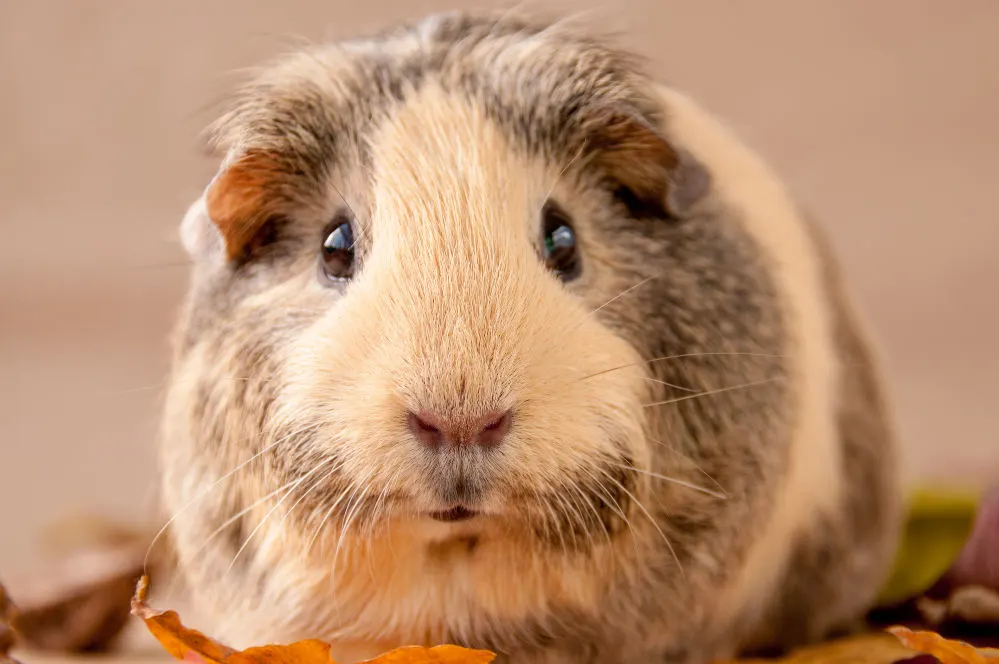
How often can I give my guinea pig strawberries?
Although strawberries have many benefits, too much of a good thing can also turn out badly. It’s not recommended for guinea pigs to eat this tasty fruit every day. One to two small amounts a week as a treat is more than enough for them to enjoy the health benefits.
If they eat too much too frequently, they run the risk of ingesting too much calcium and sugar, increasing the risks of obesity and bladder stones. So strawberries should only ever be given as a treat, and never as a meal replacement.
FAQs about feeding my guinea pig strawberries
Can guinea pigs eat strawberry seeds?
The seeds on strawberries are tiny and don’t pose a choking hazard, unlike apple seeds or watermelon seeds. So strawberry seeds are totally safe for your furball.
Can guinea pigs eat strawberry leaves?
Guinea pigs love leafy greens, and strawberry leaves count. They’re full of fiber and completely safe for your guinea pig to chow down on.
Can guinea pigs eat strawberry tops?
Strawberry tops are “tops” as far as your furry friend is concerned, and they can absolutely partake in this little delicacy. It may sound counterintuitive — obviously, the juicy fruit sounds a lot tastier to us.
But guinea pigs can prefer the crunchy tops, which are a great source of potassium, vitamin C, and natural fiber, and less sugar to boot. However, your particular piggy might prefer the sweet goodness of the fruit itself — each pig to their own!
Can guinea pigs eat strawberry jam?
This is going to be a hard no. Not only is strawberry jam cooked, which isn’t suitable for a piggy’s digestion, but it’s also packed with extra sugar that is downright bad for your guinea pig.
They can’t process sugar as well as we can, so it negatively affects their gut health, leading to an overgrowth of bad bacteria. This can cause them significant discomfort and diarrhea.
Conclusion: can guinea pigs eat strawberries?
In a nutshell, fresh strawberries are a superfood for your pet guinea pig, offering them multiple health benefits. As part of a balanced diet, your piggy will fully enjoy this addition to their weekly treat routine — leaves, tops, and all. They’ll also unwittingly enjoy a better and longer life.
If you haven’t already grabbed your keys, it’s time to head to the store and get some berries for your furry friend. Before you go, why not read up on whether guinea pigs can eat apples and pick up a couple of those too?
Steph Dyson is a travel journalist by trade but a lover of all small pets. She’s been a pet mum to everything from gerbils to guinea pigs, rabbits to hamsters, and fish to dogs of all shapes and sizes. She wants to share her years of experience with small pets and make Small Pet Guides the go-to website for pet owners seeking information and care advice.

